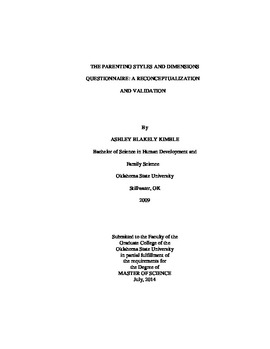| dc.contributor.advisor | Hubbs-Tait, Laura | |
| dc.contributor.author | Kimble, Ashley Blakely | |
| dc.date.accessioned | 2015-06-17T20:06:34Z | |
| dc.date.available | 2015-06-17T20:06:34Z | |
| dc.date.issued | 2014-07-01 | |
| dc.identifier.uri | https://hdl.handle.net/11244/14936 | |
| dc.description.abstract | The purpose of this study was to reconceptualize scales of the Parenting Styles and Dimensions Questionnaire (PSDQ) as a typology based on the parenting styles conceptual framework, so that all four parenting styles could be categorized from the continuous measure. Exploratory factor analysis of a sample of 378 mothers of first-grade children revealed four factors, each one representing a distinct parenting style. These were used to categorize mothers as predominantly authoritative (n=101), authoritarian (n = 100), permissive (n = 82), uninvolved (n = 85), or an undifferentiated group that did not fit any of the four styles (n = 74). Validity was supported with predicted differences in parent and family emotion-related practices, maternal depression, and feeding practices among parenting types. Minimizing responses to child negative emotion were greater for uninvolved mothers than permissive and authoritative mothers. Distress responses were higher for authoritarian and uninvolved mothers than authoritative and permissive mothers. Family problem solving was higher for permissive and authoritative mothers than the other two styles. Problem-focused responses were higher for authoritative than permissive mothers. Affective responsiveness was greater for authoritative and permissive mothers than authoritarian mothers, while lowest for uninvolved mothers. Maternal depressive symptoms were higher in uninvolved mothers than authoritative and permissive mothers. Feeding practices also differed among parenting types. Authoritarian mothers used greater restriction than permissive mothers. Authoritative mothers reported greater monitoring and encouraging healthy practices than uninvolved mothers. Permissive mothers used significantly lower levels of pressure to eat than authoritarian mothers. Modeling healthy eating was higher for authoritative and permissive than authoritarian and uninvolved. Findings expand the use of the PSDQ to measure the uninvolved parenting style and to enhance the validity of the permissive scale. Replication and further validation of these scales are needed. | |
| dc.format | application/pdf | |
| dc.language | en_US | |
| dc.publisher | Oklahoma State University | |
| dc.rights | Copyright is held by the author who has granted the Oklahoma State University Library the non-exclusive right to share this material in its institutional repository. Contact Digital Library Services at lib-dls@okstate.edu or 405-744-9161 for the permission policy on the use, reproduction or distribution of this material. | |
| dc.title | Parenting Styles and Dimensions Questionnaire: a Reconceptualization and Validation | |
| dc.type | text | |
| dc.contributor.committeeMember | Topham, Glade | |
| dc.contributor.committeeMember | Larzelere, Robert | |
| dc.contributor.committeeMember | Harrist, Amanda | |
| osu.filename | Kimble_okstate_0664M_13607.pdf | |
| osu.accesstype | Open Access | |
| dc.description.department | Human Development & Family Science | |
| dc.type.genre | Thesis | |
| dc.subject.keywords | feeding practices | |
| dc.subject.keywords | maternal depression | |
| dc.subject.keywords | parenting styles | |
| dc.subject.keywords | parenting typology | |
| dc.subject.keywords | response to negative emotion | |
| dc.subject.keywords | uninvolved parenting | |
